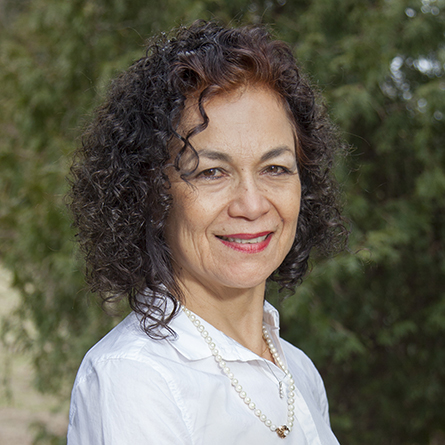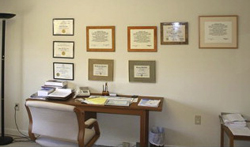
Therapists should display credentials, professor's research shows

You've probably noticed them in your doctor's office. They are usually prominently displayed by your optometrist, and your dentist likely has them hanging, too. Framed credentials - diplomas, degrees, certifications - often grace the office walls of health care professionals.
But when Professor Ann Devlin an expert in environmental psychology, noticed 13 credentials displayed in the office of a friend who is a therapist, she was intrigued. "I'm from a family that says, 'When you do well, say little. When you win, say less,' " Devlin said. "So the number of credentials caught my attention."
Inspired, Devlin devised a study to see if perceptions are influenced by a therapist's displayed credentials - and if too many credentials might negatively impact perceptions of the therapist and his or her competence. With the help of a student research team, Devlin took a series of photographs depicting a therapist's office with no hanging credentials, two credentials, four credentials and nine credentials. She also decided to test reactions to family photographs in the office. She and her students then showed each of the 227 survey participants one of the photos and asked them to answer 32 questions related to three factors: "Qualifications," "Friendliness" and "Energy."
The survey results, published in a recent edition of the Journal of Environmental Psychology, were telling. "In general, the greater the number of credentials, the more positive the judgment of the therapist in all three categories," Devlin said. "The family photos didn't have a significant impact, although there were no negative reactions to their display." Hanging no credentials had a significant negative impact on perceptions of friendliness, Devlin said, but hanging only two credentials didn't make much of a difference. "We discovered you really need more than two to have a positive effect," she said.
Devlin was also surprised to find that nine credentials did not create a backlash. In fact, there was a jump in the positive perceptions in the energy category between four credentials and nine.
"The nine credentials seemed to suggest to the survey participants that the therapist was more likely to have a goal-oriented attitude, leading the practitioner to pursue credentials to increase his or her qualifications," she said.
Devlin's overall recommendation to therapists is simple: Display your credentials.
"Displaying credentials will not substitute for the quality of care, but people do form impressions based on what they see," Devlin said. "It's a competitive health care environment, and more attention should be paid to the quality of the physical environment."
Devlin's credentials study grew from her interest in the environmental psychology of building designs. Her new book on the topic, "What Americans Build and Why," is scheduled to be released this summer. The study also gave her the opportunity to work closely with the students in her research group. Five students, who've since graduated, are listed as co-authors on Devlin's study.
One of the study's co-authors, Andrea Packard '07, said she learned so much from the experience, which helped her prepare for her senior thesis. "Working on this project my junior year gave me a clearer idea of what to expect when doing my own thesis," Packard said. "I felt more confident with my idea and overall plan."
The research groups, Devlin said, are designed to get students comfortable with the research process outside of the classroom. "Research experience is very important for students - especially those who are planning to pursue a Ph.D.," Devlin said. "At Connecticut College, we give students the tools they need to get to that next level."
January 4, 2010
